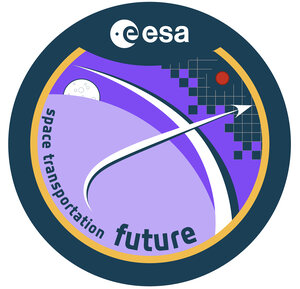Accept all cookies Accept only essential cookies See our Cookie Notice

About ESA
The European Space Agency (ESA) is Europe’s gateway to space. Its mission is to shape the development of Europe’s space capability and ensure that investment in space continues to deliver benefits to the citizens of Europe and the world.
Highlights
ESA - United space in Europe
This is ESA ESA facts Member States & Cooperating States Funding Director General Top management For Member State Delegations European vision European Space Policy ESA & EU Space Councils Responsibility & Sustainability Annual Report Calendar of meetings Corporate newsEstablishments & sites
ESA Headquarters ESA ESTEC ESA ESOC ESA ESRIN ESA EAC ESA ESAC Europe's Spaceport ESA ESEC ESA ECSAT Brussels Office Washington OfficeWorking with ESA
Business with ESA ESA Commercialisation Gateway Law at ESA Careers Cyber resilience at ESA IT at ESA Newsroom Partnerships Merchandising Licence Education Open Space Innovation Platform Integrity and Reporting Administrative Tribunal Health and SafetyMore about ESA
History ESA Historical Archives Exhibitions Publications Art & Culture ESA Merchandise Kids Diversity ESA Brand CentreLatest
Space in Member States
Find out more about space activities in our 23 Member States, and understand how ESA works together with their national agencies, institutions and organisations.
Science & Exploration
Exploring our Solar System and unlocking the secrets of the Universe
Go to topicAstronauts
Missions
Juice Euclid Webb Solar Orbiter BepiColombo Gaia ExoMars Cheops Exoplanet missions More missionsActivities
International Space Station Orion service module Gateway Concordia Caves & Pangaea BenefitsLatest
Space Safety
Protecting life and infrastructure on Earth and in orbit
Go to topicAsteroids
Asteroids and Planetary Defence Asteroid danger explained Flyeye telescope: asteroid detection Hera mission: asteroid deflection Near-Earth Object Coordination CentreSpace junk
About space debris Space debris by the numbers Space Environment Report In space refuelling, refurbishing and removingSafety from space
Clean Space ecodesign Zero Debris Technologies Space for Earth Supporting Sustainable DevelopmentLatest
Applications
Using space to benefit citizens and meet future challenges on Earth
Go to topicObserving the Earth
Observing the Earth Future EO Copernicus Meteorology Space for our climate Satellite missionsCommercialisation
ESA Commercialisation Gateway Open Space Innovation Platform Business Incubation ESA Space SolutionsLatest
Enabling & Support
Making space accessible and developing the technologies for the future
Go to topicBuilding missions
Space Engineering and Technology Test centre Laboratories Concurrent Design Facility Preparing for the future Shaping the Future Discovery and Preparation Advanced Concepts TeamSpace transportation
Space Transportation Ariane Vega Space Rider Future space transportation Boost! Europe's Spaceport Launches from Europe's Spaceport from 2012Latest

Artemis II European Service Module sound testing
Thank you for liking
You have already liked this page, you can only like it once!
The second European Service Module for the Artemis Orion spacecraft was subjected to a barrage of sound last month to test if the structure is sound. Although there is no sound in space, before getting there the Orion has to undergo an eight-minute flight through our atmosphere on NASA’s mega Moon rocket SLS, and the sound and vibrations will be intense.
During liftoff the European Service Module-2 will be atop of the 98-m tall rocket and be propelled into space by the powerful heavy-lift launcher. During the Orion spacecraft’s ascent there will be a lot of noise and vibrations, and this was simulated by placing the European Service Module-2 and the crew module adapter in between tens of speakers set to full blast.
The direct-field acoustic test had over 200 speakers producing over 140 decibels of noise. At these levels staying close is unsafe for humans without protection so most personnel are evacuated from the operations and checkout building at NASA’s Kennedy Space Center in Florida, USA, where the Moon modules are tested.
The elements passed their trial by sound and have moved onto a functional test of the complete service module with a leak-check of the extensive and intricately laid fuel lines next. The European Service Module holds 8000 l of fuel in four tanks that is distributed to 33 engines.
The first European Service Module exceeded expectations on the Artemis I mission, powering the Orion spacecraft around the Moon and back on its test flight. It supplied temperature control, propulsion and electricity for the spacecraft. For the two-week Artemis II mission the European Service Module-2 will have even more critical tasks as it needs to supply drinking water and breathable air to the four astronauts in the Orion capsule: NASA’s Reid Wiseman, Victor Glover and Christina Koch and Canadian Space Agency’s Jeremy Hansen.
In June ESA formally hands over the European Service Module-2 to NASA, ready for integration with the Orion crew capsule and then on the road to the launchpad, set for liftoff around the Moon in 2024.
-
CREDIT
NASA–Amanda Stevenson -
LICENCE
ESA Standard Licence
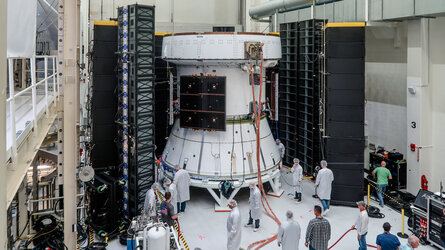
Trial by sound

Artemis II Orion in all its glory
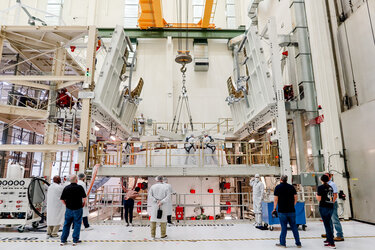
European Service Module-2 for Artemis II
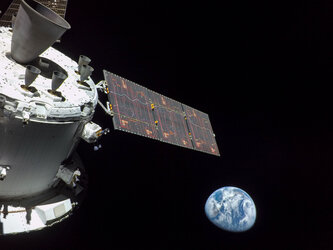
Orion, European Service Module and Earth during Artemis I
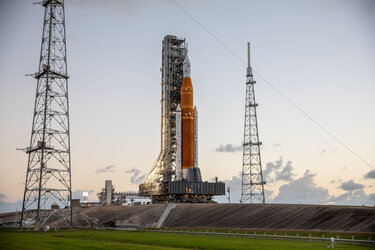














 Germany
Germany
 Austria
Austria
 Belgium
Belgium
 Denmark
Denmark
 Spain
Spain
 Estonia
Estonia
 Finland
Finland
 France
France
 Greece
Greece
 Hungary
Hungary
 Ireland
Ireland
 Italy
Italy
 Luxembourg
Luxembourg
 Norway
Norway
 The Netherlands
The Netherlands
 Poland
Poland
 Portugal
Portugal
 Czechia
Czechia
 Romania
Romania
 United Kingdom
United Kingdom
 Slovenia
Slovenia
 Sweden
Sweden
 Switzerland
Switzerland






















